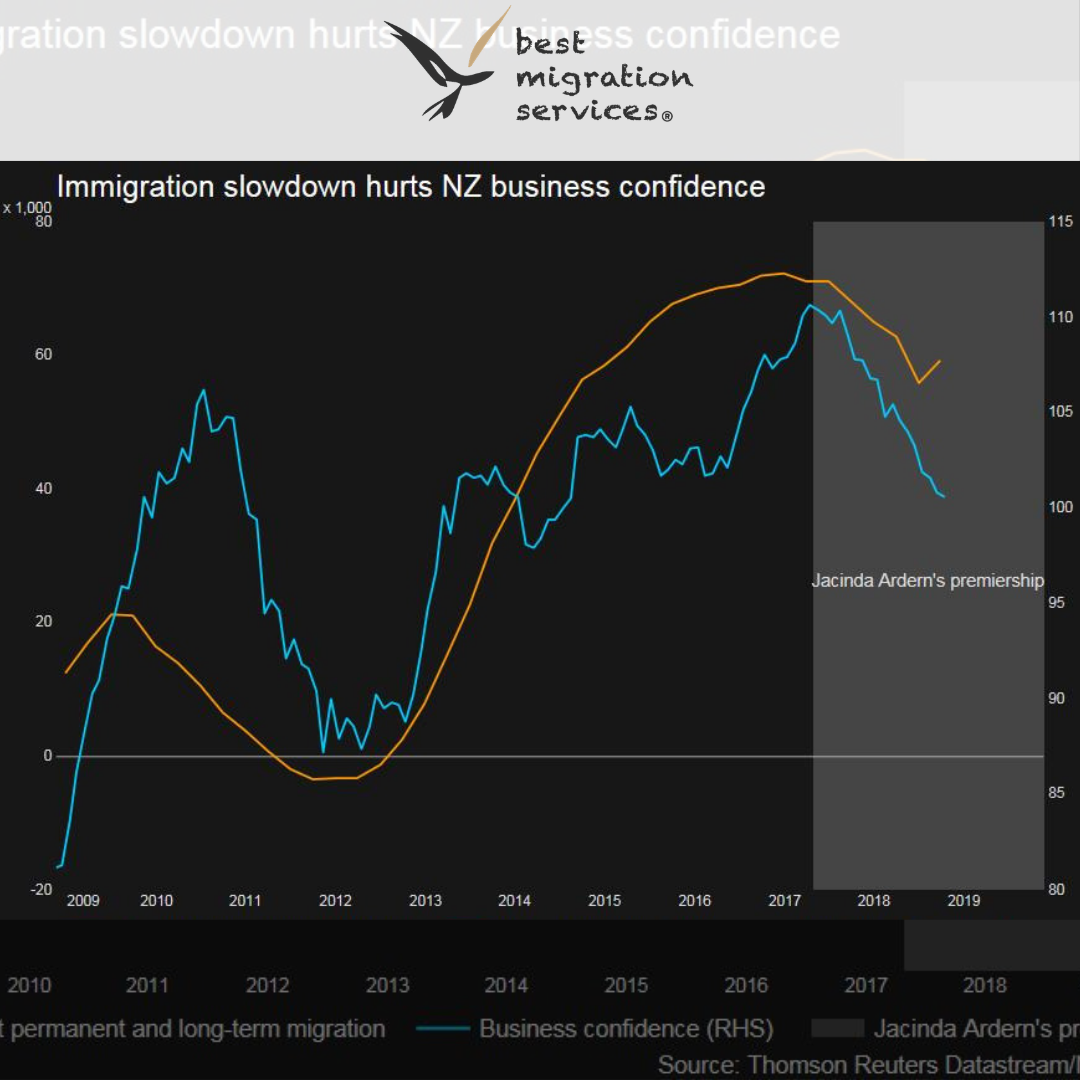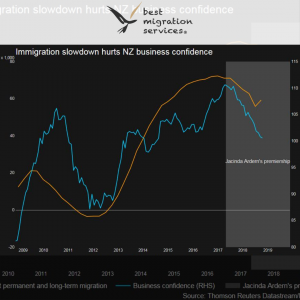

WELLINGTON (Reuters) – New Zealand pub owner Chris Dickson worries his staff is overworked. He expected employment visas for two new overseas workers to be approved weeks ago, but the paperwork was delayed with no clear reason given.
He may be left with no choice but to close down for a day, so the chefs and bartenders at his Smiths Craft Beer House in the South Island tourist hotspot of Queenstown, can get some rest.
“We are struggling to find people,” Dickson said. “It’s an epidemic.”
A plunge in net immigration is intensifying New Zealand’s labor shortage and hurting the economy to the point that the country’s central bank singled out the issue when it cut interest rates for the first time since 2016 this month.
Some businesses complain work visas are taking longer and are harder to get than previously since the election of Prime Minister Jacinda Ardern, the young leader who has been cast as something of a liberal antithesis to U.S. President Donald Trump.
Ardern came to power in 2017 promising measures predicted to reduce migration by tens of thousands a year and restrict foreign homebuyers. An overheating housing market and strained infrastructure had left many New Zealanders feeling resentful despite stellar economic growth rates.
Unemployment is at decade lows, though at 4.2% it is not unusually low by global standards.
Economists say demand for foreign labor is specific to sectors where New Zealanders don’t want the jobs – such as agriculture and hospitality – or lack certain expertise, such as construction.
Those three sectors, unfortunately, are what the nation of 5 million relies on for much of its growth.
“Migration has been an extremely dominant feature of our economic cycle and we do think it’s easing and that is contributing to the slower growth profile,” said ANZ Senior Economist Miles Workman.
The central bank this month forecasted annual net immigration of working-age people to fall to 29,000 in 2021 from 40,000 in 2018 and a mid-2017 peak of 72,400.
The moderation is partly due to tightened work visa restrictions introduced in the last months of the previous center-right National government’s tenure, but it has been persistent under the Labour-led coalition.
Ardern’s government said in December it would tighten rules for temporary worker visas to give more opportunity for New Zealanders, and recently also rolled out plans to improve vocational training.
It hasn’t tightened any broader immigration rules yet, but some businesses say the government has adopted a tougher stance in a more discrete way, with closer scrutiny on the recruitment process and slow visa processing. They also say frequent tinkering with policies such as post-study work visas, parent visas and skilled worker visas has created uncertainty.
The immigration ministry agreed there were delays, but blamed it on “operational issues”.
“I am concerned about visa delays and Immigration New Zealand is giving me regular updates about the work being done to improve processing times,” Immigration Minister Iain Lees-Galloway told Reuters in a statement.
Lees-Galloway, however, said the government did not want businesses to reach for migrant labor as the first resort.
Some foreign work visas for cafe and restaurant manager roles were declined recently due to a lack of evidence that effective training and retention strategies were being implemented by the industry to employ New Zealanders, he said.
“This doesn’t mean they can’t employ migrants, it just means they have to satisfy a labor market test before recruiting migrants,” he said.
Pub owner Dickson said businesses in Queenstown are trying to hire local staff but just can’t find enough people.
“The government needs to create a task force with local businesses to find a solution,” Dickson said.
NO CHEFS, FRUIT PICKERS
Addressing labor shortages in a pre-budget media conference on Monday, Finance Minister Grant Robertson said the government was focusing on immigration for high-need regional areas and improving the skill level of New Zealanders to meet needs.
“I don’t think we need more people coming in, but we need to make sure we are getting the right people into the right parts of New Zealand,” Robertson said. The budget will be announced on Thursday.
Migration and labor costs are weighing on business confidence, lingering at decade lows.
Fleur Caulton this year shut down one of her restaurants, Madam Woo, in the South Island city of Dunedin.
“The delay in finding chefs puts added stress and pressure on the remaining kitchen teams which is not sustainable,” Caulton told Reuters.
“We fully support the government’s objective of putting more kiwis into jobs however we struggle to find kiwis for our roles,” said Caulton.
A seasonal labor shortage was declared this month in the Bay of Plenty region, which will impact the NZ$1.2 billion ($782 million) kiwifruit export industry. Hospitals and schools have also complained of shortages.
The construction industry says it needs over 50,000 skilled workers by 2023 to meet demands.
Fletcher Building Ltd, New Zealand’s biggest construction firm, last year shut and sold loss-making units due to spiraling labor costs. Big infrastructure projects, such as the Auckland underground train system, are facing cost blow outs by more than NZ$1 billion.
“We need to get the capability on board to deliver,” said Shane Ellison, the head of Auckland Transport, which is handling the underground rail network project.
“If we don’t deliver now, we won’t be able to deliver in the coming 2-3 years,” he said.
Industries are working hard to try and attract overseas skills and know-how.
“We need top infrastructure people in New Zealand right now,” said Hamish Price, who runs an industry-led campaign called Looksee Build, particularly focused on British workers.
“We make no apologies for targeting the best of British during their period of Brexit uncertainty.
($1 = 1.5347 New Zealand dollars)

